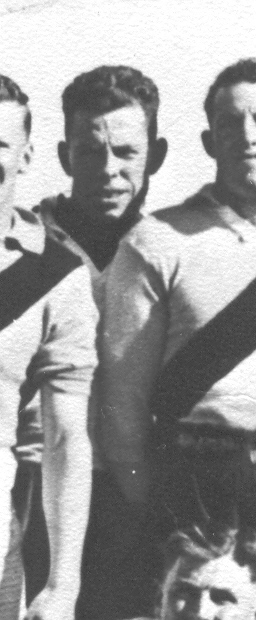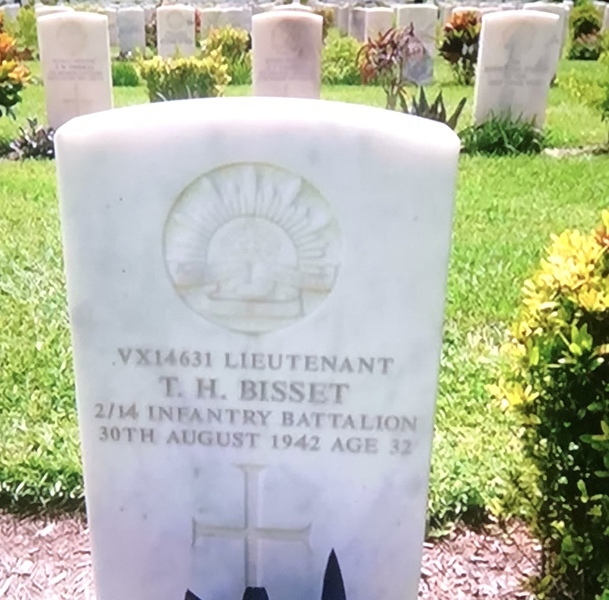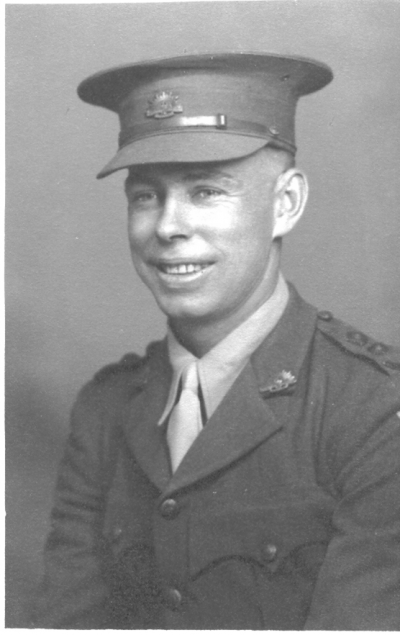Thomas Harold Butch Bisset
Thomas Harold Bisset was the son of George Simpson Bisset and Olive Noeline Bisset of Surrey Hills Victoria and the brother of Stan Bisset. He had three brothers and a sister. His parents ran a large drapers shop in Prahran, Melbourne.
Stan and Butch Bisset were the youngest brothers of the Bisset family and the two had a strong bond. They shared a great friendship, signing, playing sport and serving in the army together. In their teenage years the family moved to Warrandyte and the older brothers had now left town.
Stan & Butch found themselves growing even closer as they fished and made homemade rafts out of old kerosene cans which the sailed down the river. On one occasion when the water was up and their raft went screaming out of control before hitting a low lying branch. Stan saved Butch from being dragged under the water.
The two boys had a .22 rifle and both soon both became a good shot, able to shoot a rabbit on the run. The country life suited Butch and when he became older he went to jakarooing in Western Australia. He became a charismatic, man and was popular among his peers. Butch had joined the militia before the war and had made it up to the rank of sergeant.
When war started both brothers joined the 2/14th Battalion and were commissioned. They fought with the Battalion throughout the Syrian Campaign and into Papua New Guinea.
The final word about Butch Bisset should come from Albert Moore, the much respected and renowned Salvation Army Officer who served with the 2/14th Battalion throughout the war. In the official history of the 2/14th Battalion, he describes how he first met Butch in Syria:
“You will remember the days near Jezzine. This company had passed through the jaws of death, and the nerves of the men had been strained to breaking point. Old Jock and I had been sent to do what we could by Colonel Cannon and Captain Buckler. We arrived late in the afternoon, and soon night came upon us, and every man selected his own rock under which he might have some security for the night from straying shells. As we lay trying to snatch some sleep, the inevitable wits began to create some humour.
Out on the still Syrian night air peals of an infectious laughter came from the lips of one who to me seemed a stranger. Even if we could not catch the joke, we laughed because of the humour of this stranger. Nerves immediately loosened up, and all forgot the tension of the day. I determined that I would detect the possessor of this humour on the morrow. Consequently when day broke I made it my business to listen for the owner of this laugh. Later in the day I heard it again, and as I swung round I found dear old Butch. I had no recollection of having met him before, but from this day forth there was a keen appreciation in my heart for this friend of every man.
As the days came and went, up till that tragic day when, at Myola, someone came to me and said,’ dear old Butch has gone,’ there had always been a high regard for him in my heart. Shall I forget his peals of laughter, coming home on the City of Paris when at the meal table Butch had everyone in a good humour. This was only one side of this choice spirit, and yet what a valuable one among men, at times such as I mention, and many others when danger surrounded his men.”
The death of Butch remained with Stan for the rest of his life since that night on the Kokoda Track when Butch died in his arms.
Stan recalled of the death of his brother:
I had received word from some of the returning walking wounded that my brother was badly wounded and his men were carrying him out. At 2200 hours, he was brought back and at Don Duffy’s direction placed on the ground at the side of the track forward of our new position. Doc administered morphine and I stayed with him until 0400 hours when he died. We two were the youngest of four boys – were very close – and the loss was severe.
Another man who was with Butch when he was mortally wounded was Jim Coy. Jim Jim Coy was a tough soldier, Military Medal winner and a former teammate of Butch Bisset in the Battalion’s Australian Rules football team.

Jim recalls:
That night, we took up our positions -- 10, 11 and 12 Platoons. The Japs were now starting to hot things up! The fighting was very intense – so close to each other, we were having casualties. All our officers were dead or wounded, Lt Bisset was severely wounded. We decided to get him back to BHP. On the way out, we encountered more Japs who had taken up a position near perimeter. There was a hold up as we exchanged fire with them, with us losing two fine soldiers, M Kilburn and J Ferguson. We got back to HQ but Lt Bisset died next day – a great man!

Butch is buried in Bomana War Cemetery Row C 6 F13, Port Moresby PNG.
Lest We Forget

Butch
